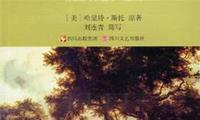麥田裡的守望者讀後感英文
The catcher in the Rye is a typical novel which reflects the confusion and rebel of the 1950s in America history. From year 1945-1955, the American society seemed to be blissful on the surface while the fear of uncertainty caused by the growing communist challenge was affecting the culture of society. People became paranoiac and youngsters of the time became rebel or even violent resulting from the lost of aim and belief. Holton, the main character of this novel, is portrayed by the author as a typical teenager of the time.
Born in a wealthy middle class family, Holton was supposed to live a good life. However, he expelled from school four times, not dare to go home, wandering alone in York city one day and two nights, living in small inn, going to nightclubs, being alcoholism. He wanted to escape from the real world because he feel depressed, confused, filled with all sorts of unrealistic fantasies. This novel can be defined as both the tragedy of Holton's and the author Salinger, who is a young people of that generation.
In 1950, the Korean War started, which was an extension of the Cold War which strengthened the hostilities and conflicts between America and the Soviet Union. It definitely leaded to the panic of normal people because they were uncertain about the result of the competition between the superpowers. Teenagers were emotionally confused of the changing society, doubting their life and their future. Salinger has also written other novels such as Nine Stories, a collection of short stories even more depressed than The catcher in the Rye, which at least have expressed some hope at the end of the novel. Actually, characters like Holton become popular at that time, not in literature only. In the film Rebel Without a Cause describe a very similar situation, the tendency of rebel and violence among youngsters in American culture at that time. In the early 1950s, the accumulation of emotions and conflicts were bedding the transform a few years later, which had significant influence on American culture of that period.
理智與情感英文讀後感
The story on Sense and Sensibility happened in the late eighteenth century, telling us that two sisters of Dashwood's pursued their love and marriage. The elder sister Elinor is full of sense and could deal with everything with calm thinking. However, his younger sister Marianne always attempt to understand the world with an excess of sensibility. They had a little sister who was too young to completely understand the passion and the pursuit of love of her two sisters. Their mother Mrs, Dashwood regarded everything as sentimentality who is very much like her daughter Marianne. Mrs. Dash wood married Mr, Dashwood after his first wife passed away. His ex-wife left a son called John Dashwood. After many years, Mr. Dashwood died of the acute disease and he left his estates and most of the money to his son. Mrs. Dashwood and her daughters didn't inherit anything. Although his son promised to take good care of his step mother and younger sisters, he didn't keep his word because of the selfness of his wife.
Sense and Sensibility build a series of diverse characters, however, for me, the most and powerful figure is Elinor. Elinor, the elder daughter of the Dashwoods, was a rational and emotional girl.At the very start, Elinor showed more sense and intelligence than her mother and younger sister. She worked carefully and considerately. She was always polite and graceful no matter who she faced. Moreover, she could permanently keep calm and sensible when she talked with others no matter the topic they talked about. It seemed that she could do anything discreetly. In addition, Elinor is also a beautiful kind girl who was clever at discovering merit of other people. For Mrs. Jennings, Elinor always mentioned her warmth, generosity and justice, although the behavior of Mrs. Jennings showed that she was a silly woman. In order that Mrs. Jennings could enjoy herself at home in London but not receive the ridicule and indifference from Marianne, and that Marianne didn't hurt herself by overdoing anything, she accepted the invitation and headed for London with her younger sister. I think, all of these showed that she is a sane person but not showed that she lacked sensibility. By contrast, Elinor was full of emotion like her younger sister, however, she was better at controlling this kind of emotion. She lost her heart to Edward and never changed her mind no matter what happened to him. She didn't abandon Edward,regardless of the fact that he wasn't good at conversation and his behavior was prim. She loved himthanks to his integrity and tolerance. Her feeling of Edward was faithful and changeless, which proved that Elinor was rational as well as emotional. She owed a clear and lucid mind to control some unnecessary emotional impulse. Sense and kindness are the proper charm of Elinor.
After reading this novel, I think, we should have unhealthy emotion but that doesn't mean emotional reasoning.As a person, if we owed the proper emotion and personality, and at the same time we can control it with reason and sense, we could get the true happiness.
在不如意的人生裡奮起直追讀後感
文/關莎莎
“青春歲月有孤獨相隨是好的,如此你才有機會認識自己;常常被人誤解也是好的,如此你才能看清誰是真正的朋友;沒有光明也是好的,如此你便學會了走出黑暗……所以,人生並非不過如此,生命原本可以更好”。這是《在不如意的人生裡奮起直追》中的一段話,它給了我一個思考的方向。如何去度過和把握生活裡的每一天,如何找到為了目標能持續產生動力和雄心的使命感,這是我該做的!
書中有一節是這樣的,
“預備!發射!瞄準!”,它的解釋是:“我們從來不等有了方法再行動,而是在行動中尋求方法,在行動中瞄準。如果射偏了,沒關係,糾正它,再發射。重要的是發射,是行動!”,在以後的工作中我會按“預備!發射!瞄準!”的行動,







